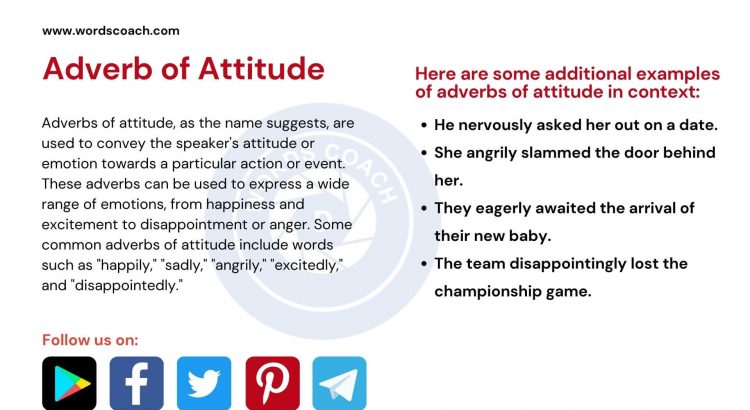Adverb of Attitude
Adverbs of attitude, as the name suggests, are used to convey the speaker’s attitude or emotion towards a particular action or event. These adverbs can be used to express a wide range of emotions, from happiness and excitement to disappointment or anger. Some common adverbs of attitude include words such as “happily,” “sadly,” “angrily,” “excitedly,” and “disappointedly.”
Adverbs of attitude are typically placed after the verb or clause that they are modifying. For example, consider the following sentence: “She walked to the store.” To add an adverb of attitude, we can say: “She happily walked to the store.” In this example, “happily” is the adverb of attitude, which modifies the verb “walked” and expresses the speaker’s positive attitude towards the action.
Adverbs of attitude can also be used to modify adjectives or other adverbs. For example, consider the following sentence: “The movie was good.” To add an adverb of attitude, we can say: “The movie was surprisingly good.” In this example, “surprisingly” is the adverb of attitude, which modifies the adjective “good” and expresses the speaker’s positive surprise towards the quality of the movie.
Here are some additional examples of adverbs of attitude in context:
- He nervously asked her out on a date.
- She angrily slammed the door behind her.
- They eagerly awaited the arrival of their new baby.
- The team disappointingly lost the championship game.
Adverbs of attitude are a valuable tool in the English language for expressing emotions and opinions towards actions or events. They are easy to use and can be added to a sentence to provide additional context and clarity. By mastering the use of adverbs of attitude, you can add depth and nuance to your writing and communication skills.
Download Words Coach: English Grammar


Very good article! We will be linking to this great content on our website.
Keep up the great writing.